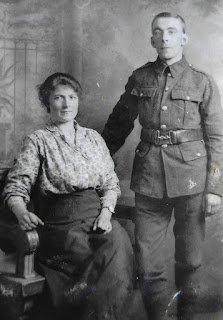Starting out at 6am the Battalion marched up on to the Asiago
Plateau, covering five arduous miles via the mountain tracks to camp at Mount
Brusabo, south-east of Cesuna.
Pte. Lewis Batey
(see 21st June) was
admitted via 71st Field Ambulance to 24th Casualty
Clearing Station; he was suffering from diarrhoea.
Maj. Edward Borrow
DSO (see 11th August) would
tell his wife in a letter home a few days later, “… We are now back in the line
on the big hill. Fancy climbing a big mountain, some 13,000 feet above sea
level, with a whole Battalion of men. That’s what we did the other day.
Starting from a flea-bitten village at 5 on a close and sultry morning and
proceeding steadily up a zigzag track on a one-in-four grade to the top…”.
(I am very grateful to
Dr. Bendor Grosvenor, @arthistorynews, for allowing me access to Maj. Borrow’s
letters).
 |
| Maj. Edward Borrow DSO |
Pte. Herbert Stott
(see below) was admitted via 69th
Field Ambulance and 39th Casualty Clearing Station to to 11th
General Hospital at Genoa; he was suffering from gonorrhoea.
Pte. Fred Sutcliffe
(see 11th June) departed
on seven days’ leave to Lake Garda.
Lt. Arthur Lilley
(see 1st August), in
training in England with the RAF, was posted back to France to continue his
training as an observer.
Pte. Harry Mawson
was admitted, wounded, to Keighley War Hospital; in the absence of a surviving
service record I am unable to establish any details of his having been wounded,
his return to England or of his service record. He was 31 years old, married,
with one daughter, and from Keighley, where he had worked as bookkeeper to a
firm of cabinet makers.
L.Cpl. William Frederick Ackrill (see 17th
April), serving in France with 2DWR, departed on two weeks’ leave to
England.
Pte. Edward Somers
(see 23rd May), serving
with 3DWR at North Shields, was appointed Acting Lance Corporal.

No comments:
Post a Comment